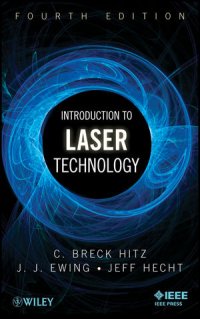
Ebook: Introduction to laser technology
The only introductory text on the market today that explains the underlying physics and engineering applicable to all lasers
Although lasers are becoming increasingly important in our high-tech environment, many of the technicians and engineers who install, operate, and maintain them have had little, if any, formal training in the field of electro-optics. This can result in less efficient usage of these important tools.
Introduction to Laser Technology, Fourth Edition provides readers with a good understanding of what a laser is and what it can and cannot do. The book explains what types of laser to use for different purposes and how a laser can be modified to improve its performance in a given application. With a unique combination of clarity and technical depth, the book explains the characteristics and important applications of commercial lasers worldwide and discusses light and optics, the fundamental elements of lasers, and laser modification.?
In addition to new chapter-end problems, the Fourth Edition includes new and expanded chapter material on:
Material and wavelength
Diode Laser Arrays
Quantum-cascade lasers
Fiber lasers
Thin-disk and slab lasers
Ultrafast fiber lasers
Raman lasers
Quasi-phase matching
Optically pumped semiconductor lasers
Introduction to Laser Technology, Fourth Edition is an excellent book for students, technicians, engineers, and other professionals seeking a fuller, more formal introduction to the field of laser technology.
Content:Chapter 1 An Overview of Laser Technology (pages 1–5):
Chapter 2 The Nature of Light (pages 7–16):
Chapter 3 Refractive Index, Polarization, and Brightness (pages 17–42):
Chapter 4 Interference (pages 43–54):
Chapter 5 Laser Light (pages 55–62):
Chapter 6 Atoms, Molecules, and Energy Levels (pages 63–72):
Chapter 7 Energy Distributions and Laser Action (pages 73–86):
Chapter 8 Laser Resonators (pages 87–97):
Chapter 9 Resonator Modes (pages 99–112):
Chapter 10 Reducing Laser Bandwidth (pages 113–127):
Chapter 11 Q?Switching (pages 129–142):
Chapter 12 Cavity Dumping and Modelocking (pages 143–153):
Chapter 13 Nonlinear Optics (pages 155–173):
Chapter 14 Semiconductor Lasers (pages 175–190):
Chapter 15 Solid?State Lasers (pages 191–213):
Chapter 16 Fiber Lasers (pages 215–223):
Chapter 17 Gas Lasers: Helium?Neon and Ion (pages 225–238):
Chapter 18 Carbon Dioxide and Other Vibrational Lasers (pages 239–247):
Chapter 19 Excimer Lasers (pages 249–261):
Chapter 20 Tunable and Ultrafast Lasers (pages 263–281):